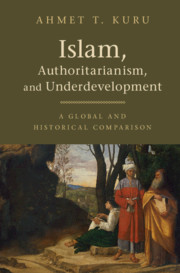Book contents
- Islam, Authoritarianism, and Underdevelopment
- Islam, Authoritarianism, and Underdevelopment
- Copyright page
- Dedication
- Contents
- Maps
- Tables
- Preface
- Introduction
- Part I Present
- 1 Violence and Peace
- 2 Authoritarianism and Democracy
- 3 Socioeconomic Underdevelopment and Development
- Part II History
- Bibliography
- Index
3 - Socioeconomic Underdevelopment and Development
from Part I - Present
Published online by Cambridge University Press: 18 June 2019
- Islam, Authoritarianism, and Underdevelopment
- Islam, Authoritarianism, and Underdevelopment
- Copyright page
- Dedication
- Contents
- Maps
- Tables
- Preface
- Introduction
- Part I Present
- 1 Violence and Peace
- 2 Authoritarianism and Democracy
- 3 Socioeconomic Underdevelopment and Development
- Part II History
- Bibliography
- Index
Summary
This chapter critically evaluates explanations that identify Western colonization/exploitation of Islam as the key factor for underdevelopment. It then explores the roles of the ulema’s anti-progressive ideas and political authoritarianism in contributing to socioeconomic underdevelopment in Muslim countries. The chapter uses the term “vicious circle” to highlight the interactivity of these problems. Next, the chapter examines the role of history and institutions. It stresses that exclusionary institutions in the Muslim world have been produced by authoritarian rulers, who hold political power, and the ulema, who provide the ideological legitimation. The chapter concludes with an explanation of why it is necessary to analyze the history of Muslim societies and polities in order to assess their contemporary problems, linking Part I of the book to Part II.
Keywords
Information
- Type
- Chapter
- Information
- Islam, Authoritarianism, and UnderdevelopmentA Global and Historical Comparison, pp. 56 - 66Publisher: Cambridge University PressPrint publication year: 2019
